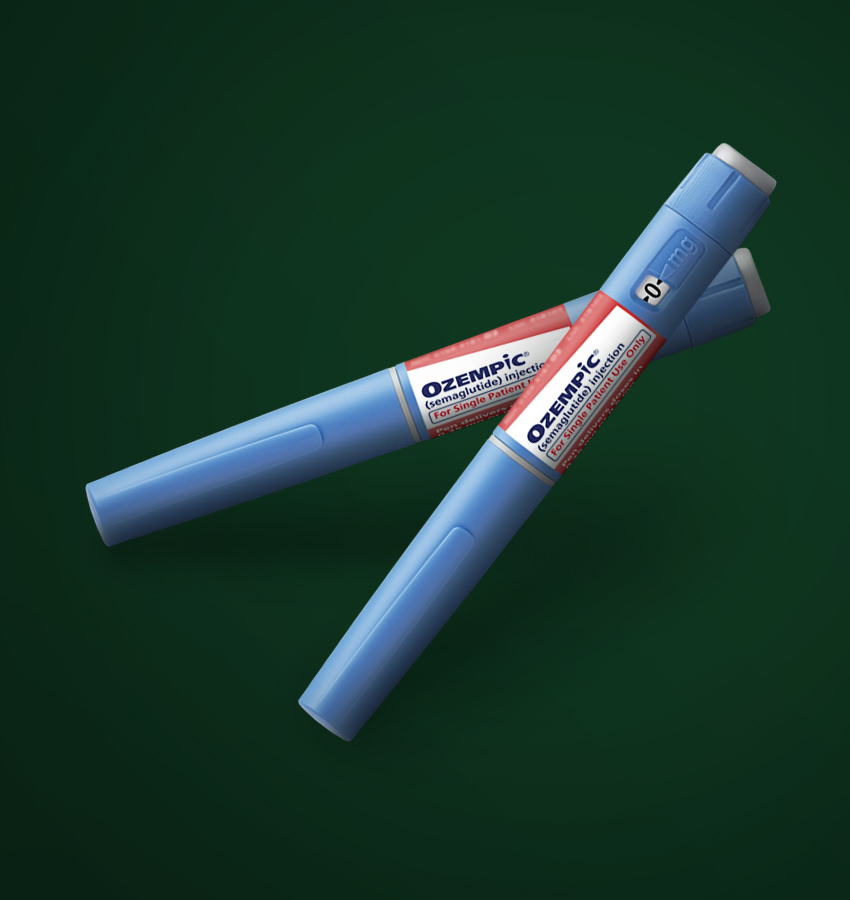Semaglutide and tirzepatide are active ingredients in effective GLP-1 medications such as Ozempic®, Mounjaro®, Zepbound®, Wegovy®, compounded semaglutide and compounded tirzepatide. These class of GLP-1 agnosits are used for managing diabetes, weight loss and other issues. There has been a lot of positive news around tirzepatide specifically as it has been shown in some studies to have superior effects than that of semaglutide (providing patients with over 20% in weight loss from baseline, a meaningful step above other GLP-1 agonists), however semaglutide is still a great option for many people.
Managing the side effects of drugs containing semaglutide and tirzepatide is a key step for individuals to maintain progress and adherence to their weight loss journey.
Side Effects due to Dosage
When beginning treatment with a medication containing semaglutide or tirzepatide, it’s important to start with a lower dose and gradually increase it. This method helps the body acclimate to the medication, reducing the risk of gastrointestinal issues such as nausea, vomiting, or diarrhea. Patients using Ozempic® injections (semaglutide) for weight loss often follow this protocol, starting with a low dose and gradually increasing it to minimize side effects.
Potential Gastrointestinal Issues
Gastrointestinal discomfort is a potential side effect when starting GLP-1 medication. To mitigate these effects:
- Nausea: Nausea is a potential side effect of GLP-1 injections. To manage nausea, start with a lower dose and gradually increase it. Eating smaller, low-fat meals and following a low-residue (low-fiber) diet can also help reduce nausea. Over time, the body typically adjusts to the medication, and nausea subsides. Additionally, taking the medication at bedtime may help, as it can allow the worst of the nausea to occur while you are sleeping.
- Upset Stomach: Symptoms like gas, bloating, indigestion, and vomiting may occur. Managing these symptoms involves adjusting the dosage and timing of the medication intake. For instance, taking medication before or after meals may help in different scenarios. Recommended remedies include ginger and peppermint. Probiotics are not recommended.
- Injection Site Reactions: Redness, swelling, and discomfort at the injection site may also occur. To minimize these reactions, ensure proper injection techniques, clean the area with an alcohol swab twice before injecting, and rotate injection sites regularly. Applying a cold pack to the injection site before and after administering the injection can also help reduce swelling and discomfort. Consult our video on how to administer your compounded medication at www.oaklovesyou.com/resources.
- Diarrhea/Constipation: Diarrhea is another frequent side effect. Staying hydrated and consuming a well-balanced diet with vegetables can help manage this. Fiber is not recommended as it can worsen nausea. Starting with a smaller dose and eating smaller, more frequent meals can also reduce the occurrence of diarrhea. Over-the-counter medications like loperamide can be used under a healthcare provider’s guidance. Though less common, constipation can occur. Adequate hydration and a well-balanced diet, including fruits, vegetables, and whole grains, are essential for prevention. If constipation persists, consult a healthcare professional. Over-the-counter fiber supplements or mild laxatives may be recommended.
- Fatigue: Fatigue may be experienced, especially in the initial weeks of treatment, as the medication reduces appetite and food intake. To combat fatigue, ensure sufficient sleep, a nutrient-rich diet, regular exercise, and consider consultation with a nutritionist or dietitian. Maintaining a consistent sleep schedule and avoiding caffeine and electronics before bedtime can improve sleep quality.
- Belching and Flatulence: These symptoms may result and might be due to the medication’s impact on the gastrointestinal system. Adjusting the diet to avoid gas-producing foods, such as beans, dairy, and carbonated beverages, can help. Generally, these symptoms decrease as the body adjusts to the medication. Keeping a food diary and considering a low FODMAP diet can help avoid certain gas-producing foods. Chewing food slowly and avoiding gum can also reduce air swallowing, which contributes to gas.
Side Effects Management Strategies
- Proper Hydration: Drinking plenty of water is vital for managing many side effects, including constipation, diarrhea, and fatigue. Hydration helps regulate digestion and reduces symptom severity. Aim for at least 8-10 glasses of water a day, and more if you are active or in a hot climate.
- Dietary Adjustments: Adjusting your diet can help manage side effects such as upset stomach and belching. Avoid foods known to cause gas, like beans and dairy products, and eat smaller, more frequent meals. Incorporating low-fiber foods initially and gradually adding fiber back into the diet can also help manage gastrointestinal symptoms.
- Exercise: Regular physical activity can alleviate side effects like constipation and fatigue. Exercise also supports overall well-being and weight loss efforts. Aim for at least 30 minutes of moderate exercise, such as walking or swimming, most days of the week. Incorporating strength training and flexibility exercises can further enhance your health.
- Proper Medication Administration: Proper administration techniques, such as injecting the medication subcutaneously in recommended areas (e.g., abdomen, thigh, or upper arm) and rotating injection sites, can prevent skin irritation and discomfort. Following the medication’s instructions carefully, consult with your oak healthcare provider or visit www.oaklovesyou.com/resources for helpful videos on how to administer your GLP-1 medication correctly.
Managing the side effects of compounded semaglutide and tirzepatide is very manageable. Be sure to consult your Oak physician in your patient portal and dashboard, for any questions you may have. You can always reach out to care@oaklovesyou.com for any questions as well!
Complete a quick form for a free physician consult to learn how an Oak Longevity GLP-1 prescription (Ozempic®, Zepbound®, Wegovy®, Ozempic®, compounded semaglutide, compounded semaglutide + more) can help you lose up to 23% of your weight (clinically-proven*) on the Oak Longevity Program™. Oak’s Care Team is available to you during your journey for free support and guidance.





